
Mexican Fire Opal Gemstone: Properties, Meanings, Value & More
 The Mexican fire opal gemstone is a red to yellow opal variety set apart by its unique transparency and cuts. Unlike most opaque and unfaceted opals, fire opals are translucent to transparent and typically faceted.
The Mexican fire opal gemstone is a red to yellow opal variety set apart by its unique transparency and cuts. Unlike most opaque and unfaceted opals, fire opals are translucent to transparent and typically faceted.
Are Mexican fire opals real? Yes, fire opals form naturally!
Mexico is the most important and abundant source of fire opals. They’ve even named it their national gemstone!
Is Mexican fire opal rare? Compared to most opals, the fire opal variety is rare, but they’re fairly common compared to rarer gemstones.
Today, we’ll tell you all the meanings, properties, and lore that make fire opals such a special gemstone.
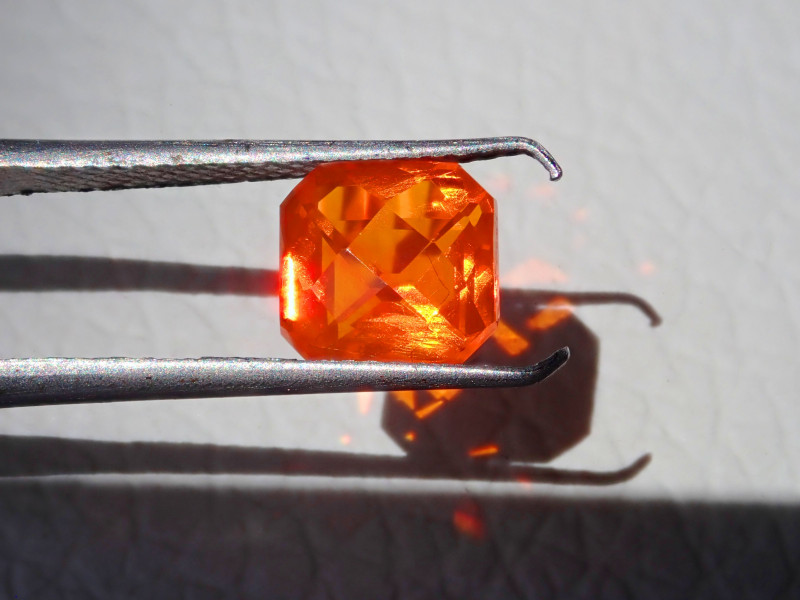
About Mexican Fire Opal Stone
Fire opal is a semi-precious gemstone with autumn hues. Red fire opals are sometimes called “cherry opal,” while bright yellow specimens have the trade name “sun opal.”
Is fire opal a birthstone? Yes, fire opal is a mystical April birthstone, and an alternative to the traditional opal October birthstone. As a zodiac stone, fire opals are lucky for Aries.
Know someone celebrating an anniversary? Opals are the traditional commemorative gem for the 34th wedding anniversary, along with an alternative gemstone for the 12th and 14th anniversaries. A Mexican fire opal necklace makes the perfect gift!

Mexican Fire Opal Specifications & Characteristics
Like all opals, fire opals are mineraloids, meaning they look like minerals but don’t have crystal structure or consistent composition.
All opals are hydrated silica, though their water content varies. Fire opals are typically 3-10 percent water. Traces of iron create the Mexican opal’s signature colors.
Besides transparency and cut, other traits that distinguish fire opals are their hardness and lack of opalescence. Most opals are 5.5-6.5 on the Mohs mineral hardness scale, but fire opals are 6-6.5. Opalescence, a hazy glow that appears inside opals, is absent in fire opals.
Here are the remaining Mexican fire opal properties:
Color: Orange, yellow, red, brown, or a combination of these
Crystal structure: None (amorphous)
Luster: Sub-vitreous, waxy, or resinous
Transparency: Translucent to transparent
Refractive index: 1.37-1.52
Density: 1.92-2.38
Cleavage: None
Fracture: Conchoidal or uneven
Streak: White
Luminescence: Usually fluorescent; Inert to moderate; Greenish-brown in SW-UV and LW-UV
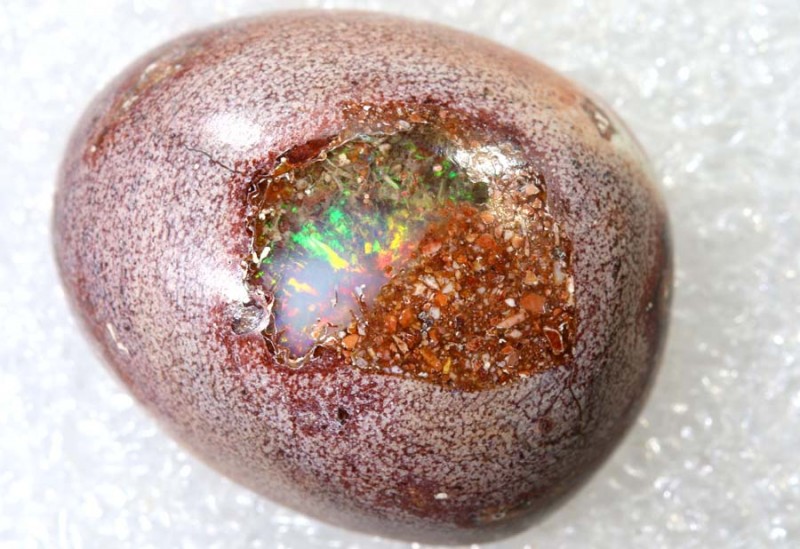 Image: Cantera opal
Image: Cantera opal
Types of Fire Opal
The major types of fire opal are common vs. precious. Precious (or noble) fire opals display iridescent color flashes called play-of-color. Common fire opals (called simply “fire opals”) don’t show play-of-color.
Other fire opal varieties include:
Matrix Fire Opal: Fire opals dispersed throughout the rock they grew inside of (their host rock).
Cantera Opal: Mexican fire opal in matrix with speckled, pink rhyolite, cut into egg-like shapes.
Contraluz Fire Opal: Named from the Spanish for “against light,” a precious fire opal with play-of-color seemingly floating inside when lit from behind.
More abstractly, what does Mexican fire opal symbolize?
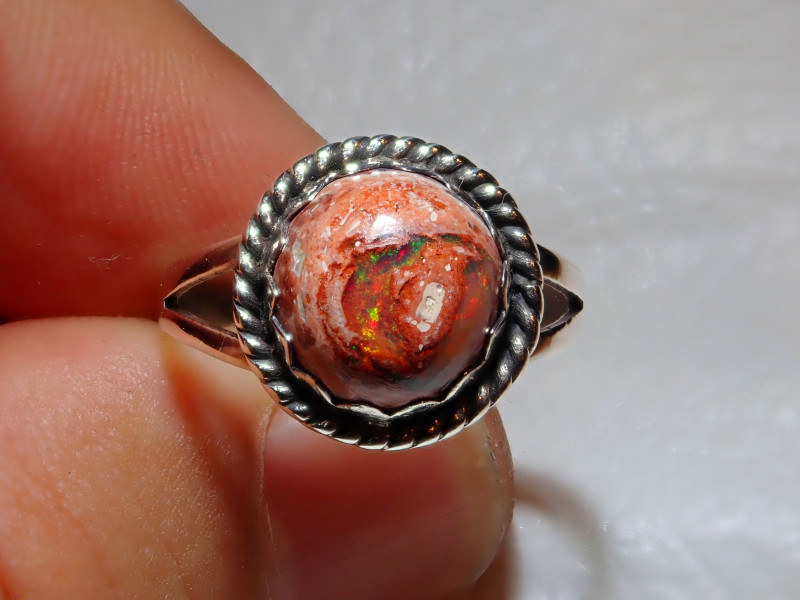
Mexican Fire Opal Meaning & History
Mexican fire opal symbolizes pure inner joy, along with luck, success, and passion.
Mexican fire opal’s spiritual meaning was sacred to ancient Aztec and Mayan cultures.
They called fire opal quetzalitzlipyollitli, meaning “the stone of the bird of paradise.” This name might reflect the eponymous flower’s vibrant colors or the ancient belief that only waters from paradise could produce fire opal. Another Aztec nickname was vitzitziltecpal, or “hummingbird stone.”
Elsewhere in ancient times, Persians and Indians believed fire opals represented burning love. Romans called opals “opalus,” after the Latin opis for “plenty.” They tied these gems to Ops, the wife of Saturn and goddess of fertility.
History
As early as 850 AD, Aztecs used the gem for creating mosaics, enhancing the power of religious rituals, and adorning those with high status in Mexican fire opal jewelry.
After Spanish conquistadors came to Central America in the 1500s, they brought these opals back to Spain, establishing them in Europe.
Still, the eminent mines of ancient Mexico slipped into obscurity until 1835, when miners found the forgotten deposits in the mountainous regions of Queretaro. Subsequently, fire opal jewelry became quite popular in Europe in the mid-1800s.
In recent times, a couple hiking in Brazil accidentally discovered a top-quality fire opal, eventually named Dourada Fire Opal after the Portuguese term for “golden.”
Dourada fire opal gems lack play-of-color, but have vibrant yellow to orange hues, good clarity, and massive sizes.
Nowadays, what is Mexican fire opal used for in crystal healing?
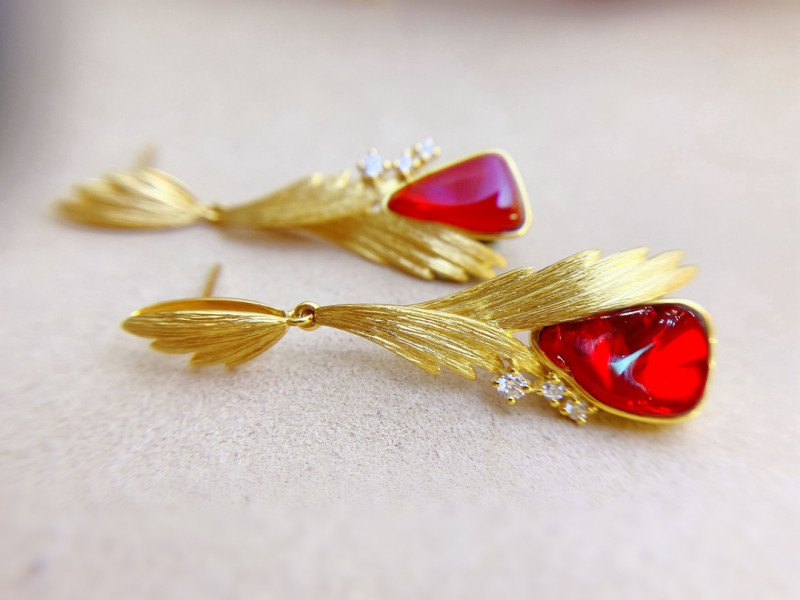
Mexican Fire Opal Healing Properties
Gems can be used as healing stones because of their coloring and innate spiritual properties. Red gems like red fire opal are believed to increase motivation, strength, and passion. Meanwhile, orange fire opal joins other orange stones in purportedly bringing hope, joy, and creativity.
Lastly, yellow gemstones like yellow fire opals are said to increase confidence and concentration, along with balancing the solar plexus chakra.
What does fire opal do spiritually in physical and emotional realms?
Physical Healing
Fire opals are said to help heal lower back pain and kidney problems. They may also balance adrenaline and period-related hormones like estrogen to reduce negative PMS symptoms. Lastly, crystal healers use fire opal to increase stamina.
Emotional Healing
Fire opals can help improve confidence and passion. In relationships, the stone is said to heal heartbreak and strengthen hope for new love.
Crystal healers use the gem for greater emotional expression, willpower, and peace. It’s also said to clarify your true desires.
Outside of healing, are Mexican opals valuable? You bet! Their gemstone value depends on certain factors called gemstone properties.
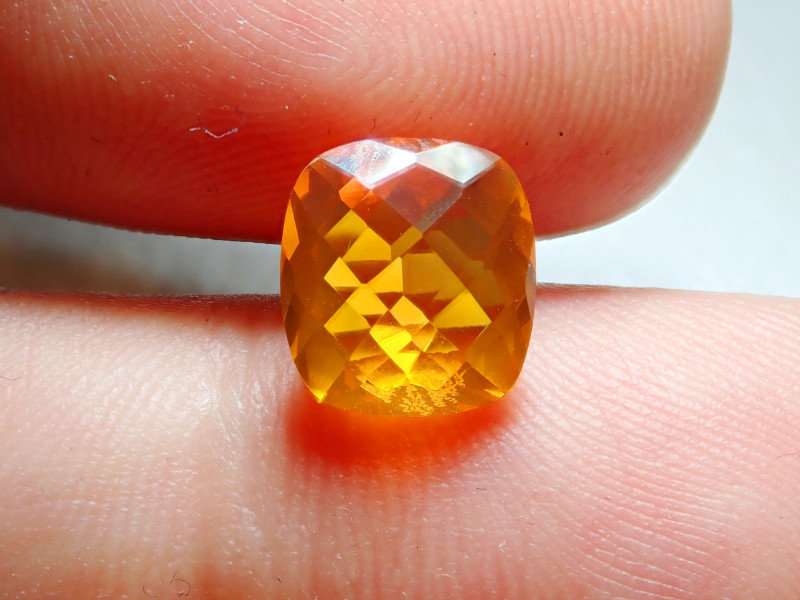
Mexican Fire Opal Gemstone Properties
The key gemstone properties for determining Mexican fire opal value are color, iridescence, and transparency. However, cut, clarity, and treatments also play a role.
Color & Iridescence
The most valuable fire opal color is saturated medium red to orange-red with no brown undertones. Orange or yellow stones are more abundant and affordable.
Nevertheless, any color that’s naturally saturated and uniform is valuable. Some stones may show uneven color distribution (color zoning), which lowers value.
Iridescence-wise, the best fire opals possess not only intense medium orange-red coloring but also strong play-of-color.
Cut
Gem cutters most often use faceted cuts for fire opal. While oval is standard, the huge sizes of Dourada fire opal present opportunities for unique shapes, beads, or carvings.
Usually, a Mexican fire opal cabochon is more translucent or cloudy. Precious fire opal cabochons are the exception, holding greater value than faceted, common fire opal.
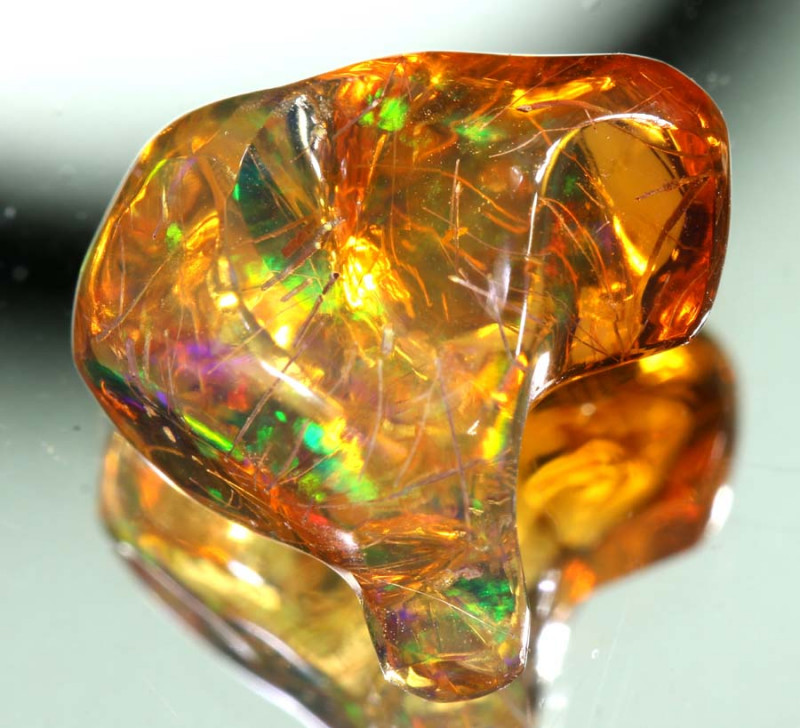
Clarity & Transparency
Clarity describes the amount of inclusions visible in the gem, which can influence transparency. Transparent fire opals with little to no visible inclusions are rare, fetching high prices. These specimens are popular for Mexican fire opal earrings.
Most fire opals are transparent and somewhat included with fluid or minerals like pyrite, which can be dendritic or flaky. If these inclusions reach the surface of the opal, the stone is likely less durable.
Carat Weight
Larger fire opals are rarer and generally more expensive than smaller ones. However, larger specimens usually have more flaws, which could negatively affect their value.
Treatments & Synthetics
Is fire opal treated? Sometimes. Most treatments improve the gem’s durability, like fracture filling or resin coating. Some Ethiopian fire opals may undergo color-enhancing smoke or sugar treatments.
The first official synthetic fire opal from Rhea Industries appeared in 2008. The company calls their synthetic fire opal Mexifire and continues to fine-tune the process.
How can you tell if a fire opal is real? The original Mexifire stones differ from natural fire opal in two main ways:
Lower Density: 1.63 (natural is 1.92-2.38)
Inclusion Patterns: Scattered pinpoints (natural has flaky or dendritic patterns)
The newer Mexifire stones have closer properties to natural fire opal — like 2.19 density — but still display pinpoint inclusions.
Synthetic gems are lab-grown, but how does natural fire opal form?
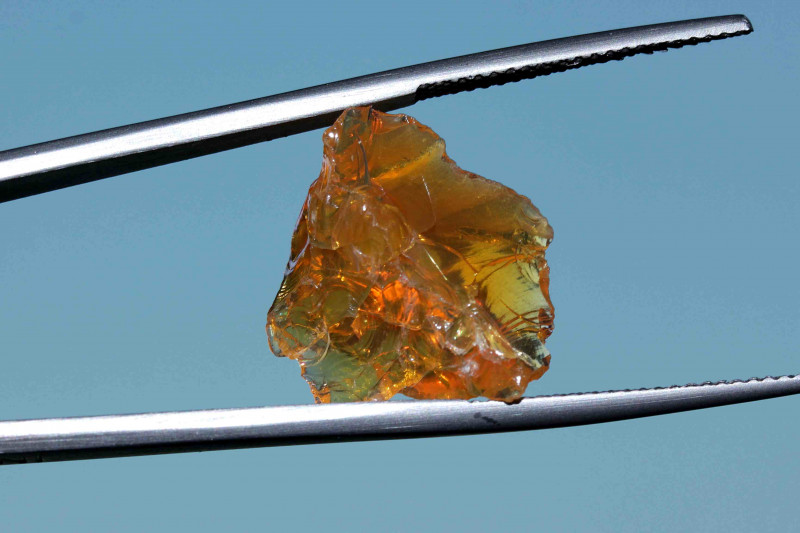
Mexican Fire Opal Formation & Sources
All opals form from silica and water. But, most opals grow within crevices in the Earth’s crust at fairly low temperatures. Conversely, fire opals form around the extreme heat of ancient volcanoes.
The process starts when water penetrates lava containing silica. The water picks up silica and traces of iron oxide, then settles into open crevices in the lava, contained by the extreme pressure and heat.
Most of the water evaporates, leaving behind tiny, hydrated silica spheres that join together and solidify into fire opal. Uniformly sized and arranged spheres create precious fire opal. Non-uniform spheres create common fire opals.
Cantera opal forms similarly. Lava cools and turns into rhyolite. As it cools, some gasses inside depart, leaving behind empty veins or cavities. The silica water fills these larger spaces, creating the dispersed matrix.
Overall, you’ll find stronger raw Mexican fire opal in drier environments. But where is Mexican fire opal found?
Mining Locations
Mexico and South America produce the majority of fire opals. Seven states in Mexico have fire opal, but Queretaro mines are the most significant.
Mexico is also known for cantera and contraluz fire opals. Brazil is known for its Dourada fire opals. Virgin Valley in Nevada, USA, has a small but notable supply of precious black fire opals, while Ethiopia produces precious fire opals.
Fire opal also comes from:
Australia
British Columbia, Canada
Guatemala
Honduras
Oregon, USA
Turkey
Next, are fire opals expensive? Not always — it depends on quality factors.
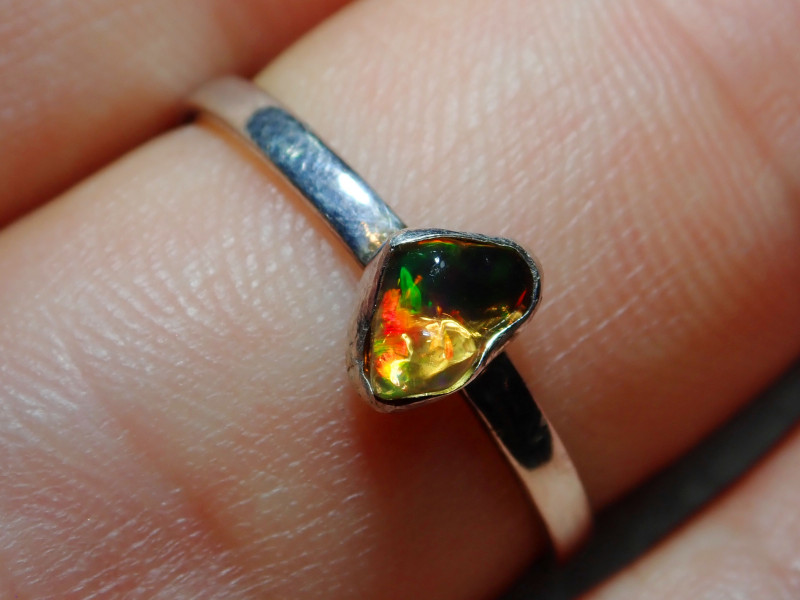
Mexican Fire Opal Price & Value
Mexican fire opal price per carat can range from $10-$10,000 per carat. The highest-value gems have intense orange-red color with brown undertones, strong play-of-color, and inclusion-free transparency. These fire opals are usually $115 for 1-carat gems.
Red, faceted fire opals cost around $30-$150 per carat at wholesale prices, though some can reach $210 per carat if they’re inclusion-free, iridescent, and well-cut. Faceted orange fire opals typically cost $10-$55 per carat.
Light yellow to white fire opals are more affordable, from $10-$27 per carat for most faceted gems. Still, some inclusion-free yellow faceted gems with play-of-color and a master cut can reach $70-$90 per carat.
Most fire opal cabochons are $7-$20 per carat. Fire opal rough is the most affordable at $3.50-$6 per carat.
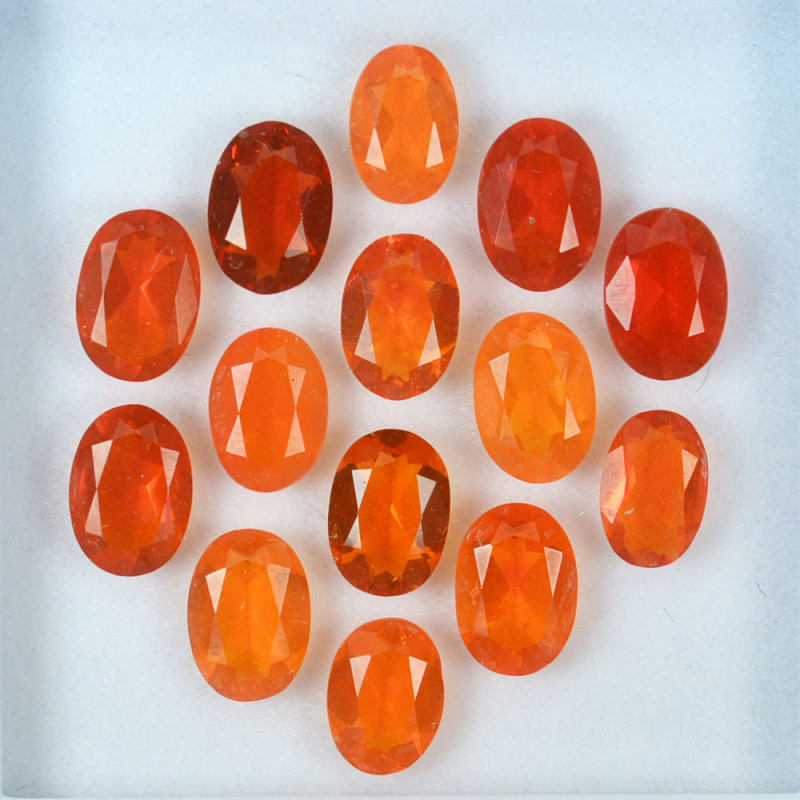
Mexican Fire Opal Care and Maintenance
With only mid-range hardness and susceptibility to cracking, fire opal requires proper gemstone care. Vulnerable jewelry like a Mexican fire opal ring should have protective settings, especially with more fragile cuts like pear or marquise.
Can Mexican fire opal go in water? If it’s a doublet or triplet, no. For all others, yes, but sparingly. Too much water is potentially damaging.
However, drying out can reduce color intensity and cause cracks. Luckily, fire opals naturally retain moisture from air and skin contact when worn!
How do you clean a Mexican fire opal? Rinse the stone under lukewarm water and dry it with a soft cloth. If needed, you can use a soft toothbrush and mild soap to gently scrub away dirt or dust. Only wipe down doublets and triplets with a soft cloth to clean them.
Keep your fire opal stone away from:
Intense light
Extreme heat
Rapid temperature changes
Perfume or makeup with strong chemicals
Bleach, acids, and alkaline solutions
Other gemstones
Remove fire opal jewelry before sleep or intense activities. Storing it beside a moist cloth or cotton ball inside a plastic bag will avoid drying. Keep the bag in a dark, room-temperature, and pH-neutral place.
Ignite Your Confidence with Fire Opal!
Mexican fire opals are extraordinary not only for their brilliant hues but rich connection to ancient history and potential for varied, gorgeous jewelry.
You can opt for a single-colored, iridescent, or even matrix fire opal. Regardless, its dazzling colors and confidence-boosting properties are sure to turn heads!
Search the Gemstone Encyclopedia
Related Auctions
Related Articles
Originally the Birthstones or gemstones were associated with a zodiac sign or the month of a individuals birth. Find out what your stone is and view the stones we have for sale
8th Feb 2021
There are dozens of quartz and chalcedony gems with various colors and patterns. Learn all about quartz properties and every type of quartz, from amethyst and agate to plasma and phantom quartz!
15th Oct 2020
Hackmanite is a pink to violet sodalite gem known for its unique color-change and luminescence. Learn why hackmanite is special, from its rare qualities to the types of hackmanite jewelry available.
28th Mar 2018
Latest Articles
Shortite is a rare mineral and rarer gemstone, usually found as colorless or yellow wedge-shaped crystals. Learn the value, history, and properties of shortite in this guide!
9th Dec 2024
Senarmontite is an uncommon antimony mineral mostly used industrially but occasionally collected as rare gems or pearly crystals. Find out all of the traits, uses, prices, and history of senarmontite.
27th Nov 2024
Tantalite is a group of red, brown, or black minerals containing the rare and valuable element tantalum. Discover the uses, history, prices, and properties of tantalite gemstones in this guide!
11th Nov 2024
Article Categories
How To's is where you will find helpful articles from gem Rock Auctions on how to cut gemstones, select gemstones and buy gemstones.
9 Articles





